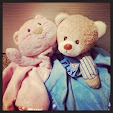Today's Hotcakes: Erikson's theory of psychosocial development
Knowing the psychosocial stage of a child's life is important in parenting..
Stage 1: Trust vs Mistrust (Birth to 1 yr)
For the infant, the sense of trust develops if he is predictably cared for when he cries and is warmly treated by her primary caregivers. If an infant, instead, is uncared for such as not being fed, diapered or comforted when necessary, this infant may develop a lifetime of mistrust for others.
Stage 2: Autonomy vs Shame & Doubt (1 yr to 3 yr)
Children want to do things on their own or act autonomously but there is a delicate interplay between freedom and restraint. Parents would want to let go of their child without considerations of safety issues. Interestingly, the child also has a conflicting need to be free but still holds on.
1. when you must impose restrictions, never humiliate a child physically or verbally
2. provide children with adequate opportunities to do things for themselves, even if it means the task becomes messier or takes more time than when an adult does it
3. set up discipline in which the same consequence is administered consistently each time a rule is broken
Stage 3: Initiative vs Guilt (4 yr to 5 yr)
Children began to ask questions about and experiment with the things around them. While such questioning and experimenting can be quite tiring for the adults in a child's life, they should be welcomed and encouraged as steps of essential growth. In situations which a child is discouraged from taking the initiative, the child may develop a sense of guilt regarding his natural tendency to explore and investigate.
As teacher, I guess I am towards identifying the pschosocial stages my students are in and weave my teaching in accordance to their needs..
Stage 4: Industry vs Inferiority (6 yr to 11 yr)
After trying, children now want to succeed and gain recognition for producing things. Without this sense of industry, children may feel that they are a failure at everything. Positive peer relationship is also important in a child's development. Peer rejection can hinder the child in his competence to make friends and develop social skills.
Stage 5: Identity vs Role Confusion (12 yr to 18 yr)
A significant part for personal identity concerns physical appearance. Next is sexuality identity. Adolescents constantly search for comfortable expressions of sexuality through friendship and dating. They also tries to find or clarify their own personalities, sometimes, through imitation. Questions like "who am I" and "who will I become" repeatedly overwhelm the adolescent. Some teens may approach choice of occupation from a short-term perspectives and it is important to steer them to go beyond their secondary school education to ensure that they explore a wider range of options.
Perhaps, I have to reflect upon the psychosocial stage I am in as well.. And if there is a fellow teacher who is acting weirdly, I can try to gauge which horrible stage he is in and laugh at him? haha.. just kidding..
Stage 6: Intimacy vs Isolation (18 yr to 35 yr)
The development of a true and intimate relationship enables an individual to care for others without losing their self-identity. Those who never experience this intimacy may develop a sense of isolation and tend to avoid relationship with others and make commitments. Marriage or non-marriage can affect teaching.
I guess I will never reach the next stage so soon.. But with so many old people at home, this may be useful as a guide..
Stage 7: Generativity vs Stagnation (35 yr to 65)
If the middle-aged is psychologically healthy, he will be focused on the care and well-being of the next generation without being overly self-concerned. If the sense of creativity or productivity is not present, the individual may experience stagnation and become overly self-preoccupied.
Stage 8: Integrity vs Despair (over 65 yr)
Individuals who have managed to adapt to the triumphs and tragedies of life are able to review their lives with a sense of satisfaction and acceptance. Others may be absorbed with despairing over missed opportunities, age or failure.
Today's Hotcakes is adapted from "Educational Psychology" by Tan et. al.
Love,
ms ang dumm dumm
Stage 1: Trust vs Mistrust (Birth to 1 yr)
For the infant, the sense of trust develops if he is predictably cared for when he cries and is warmly treated by her primary caregivers. If an infant, instead, is uncared for such as not being fed, diapered or comforted when necessary, this infant may develop a lifetime of mistrust for others.
Stage 2: Autonomy vs Shame & Doubt (1 yr to 3 yr)
Children want to do things on their own or act autonomously but there is a delicate interplay between freedom and restraint. Parents would want to let go of their child without considerations of safety issues. Interestingly, the child also has a conflicting need to be free but still holds on.
1. when you must impose restrictions, never humiliate a child physically or verbally
2. provide children with adequate opportunities to do things for themselves, even if it means the task becomes messier or takes more time than when an adult does it
3. set up discipline in which the same consequence is administered consistently each time a rule is broken
Stage 3: Initiative vs Guilt (4 yr to 5 yr)
Children began to ask questions about and experiment with the things around them. While such questioning and experimenting can be quite tiring for the adults in a child's life, they should be welcomed and encouraged as steps of essential growth. In situations which a child is discouraged from taking the initiative, the child may develop a sense of guilt regarding his natural tendency to explore and investigate.
As teacher, I guess I am towards identifying the pschosocial stages my students are in and weave my teaching in accordance to their needs..
Stage 4: Industry vs Inferiority (6 yr to 11 yr)
After trying, children now want to succeed and gain recognition for producing things. Without this sense of industry, children may feel that they are a failure at everything. Positive peer relationship is also important in a child's development. Peer rejection can hinder the child in his competence to make friends and develop social skills.
Stage 5: Identity vs Role Confusion (12 yr to 18 yr)
A significant part for personal identity concerns physical appearance. Next is sexuality identity. Adolescents constantly search for comfortable expressions of sexuality through friendship and dating. They also tries to find or clarify their own personalities, sometimes, through imitation. Questions like "who am I" and "who will I become" repeatedly overwhelm the adolescent. Some teens may approach choice of occupation from a short-term perspectives and it is important to steer them to go beyond their secondary school education to ensure that they explore a wider range of options.
Perhaps, I have to reflect upon the psychosocial stage I am in as well.. And if there is a fellow teacher who is acting weirdly, I can try to gauge which horrible stage he is in and laugh at him? haha.. just kidding..
Stage 6: Intimacy vs Isolation (18 yr to 35 yr)
The development of a true and intimate relationship enables an individual to care for others without losing their self-identity. Those who never experience this intimacy may develop a sense of isolation and tend to avoid relationship with others and make commitments. Marriage or non-marriage can affect teaching.
I guess I will never reach the next stage so soon.. But with so many old people at home, this may be useful as a guide..
Stage 7: Generativity vs Stagnation (35 yr to 65)
If the middle-aged is psychologically healthy, he will be focused on the care and well-being of the next generation without being overly self-concerned. If the sense of creativity or productivity is not present, the individual may experience stagnation and become overly self-preoccupied.
Stage 8: Integrity vs Despair (over 65 yr)
Individuals who have managed to adapt to the triumphs and tragedies of life are able to review their lives with a sense of satisfaction and acceptance. Others may be absorbed with despairing over missed opportunities, age or failure.
Today's Hotcakes is adapted from "Educational Psychology" by Tan et. al.
Love,
ms ang dumm dumm
&transparency=0&image=image55.png&meter=meter50_06.png)




0 Comments:
Kommentar veröffentlichen
<< Home